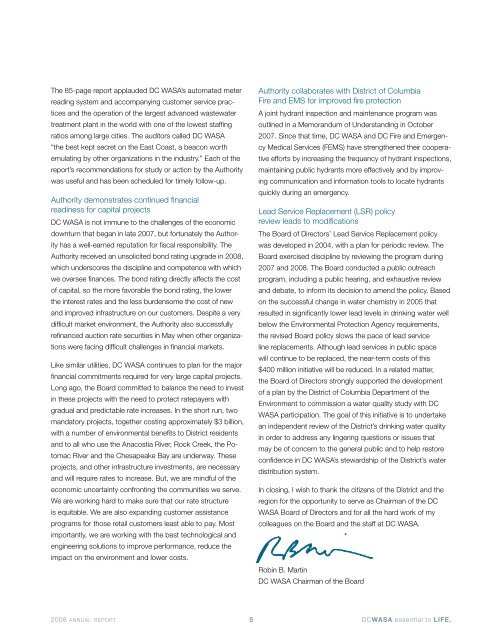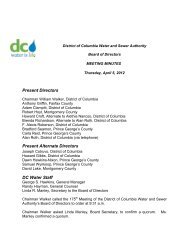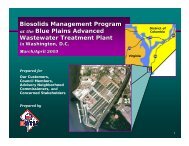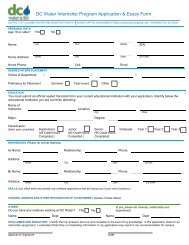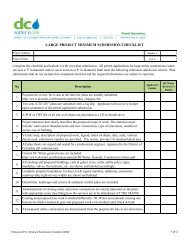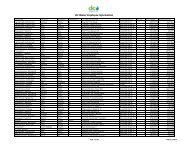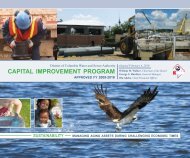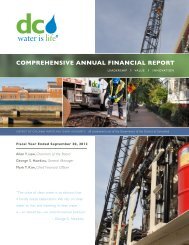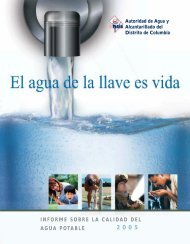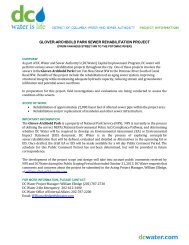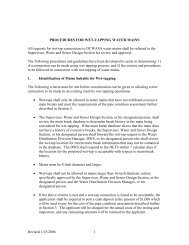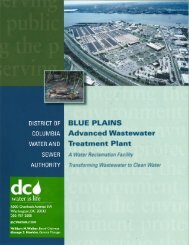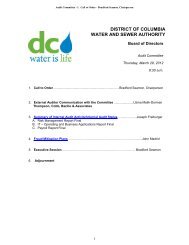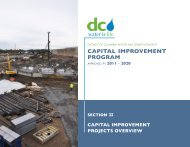2008 Annual Report - DC Water
2008 Annual Report - DC Water
2008 Annual Report - DC Water
You also want an ePaper? Increase the reach of your titles
YUMPU automatically turns print PDFs into web optimized ePapers that Google loves.
The 85-page report applauded <strong>DC</strong> WASA’s automated meter<br />
reading system and accompanying customer service practices<br />
and the operation of the largest advanced wastewater<br />
treatment plant in the world with one of the lowest staffing<br />
ratios among large cities. The auditors called <strong>DC</strong> WASA<br />
“the best kept secret on the East Coast, a beacon worth<br />
emulating by other organizations in the industry.” Each of the<br />
report’s recommendations for study or action by the Authority<br />
was useful and has been scheduled for timely follow-up.<br />
Authority demonstrates continued financial<br />
readiness for capital projects<br />
<strong>DC</strong> WASA is not immune to the challenges of the economic<br />
downturn that began in late 2007, but fortunately the Authority<br />
has a well-earned reputation for fiscal responsibility. The<br />
Authority received an unsolicited bond rating upgrade in <strong>2008</strong>,<br />
which underscores the discipline and competence with which<br />
we oversee finances. The bond rating directly affects the cost<br />
of capital, so the more favorable the bond rating, the lower<br />
the interest rates and the less burdensome the cost of new<br />
and improved infrastructure on our customers. Despite a very<br />
difficult market environment, the Authority also successfully<br />
refinanced auction rate securities in May when other organizations<br />
were facing difficult challenges in financial markets.<br />
Like similar utilities, <strong>DC</strong> WASA continues to plan for the major<br />
financial commitments required for very large capital projects.<br />
Long ago, the Board committed to balance the need to invest<br />
in these projects with the need to protect ratepayers with<br />
gradual and predictable rate increases. In the short run, two<br />
mandatory projects, together costing approximately $3 billion,<br />
with a number of environmental benefits to District residents<br />
and to all who use the Anacostia River, Rock Creek, the Potomac<br />
River and the Chesapeake Bay are underway. These<br />
projects, and other infrastructure investments, are necessary<br />
and will require rates to increase. But, we are mindful of the<br />
economic uncertainty confronting the communities we serve.<br />
We are working hard to make sure that our rate structure<br />
is equitable. We are also expanding customer assistance<br />
programs for those retail customers least able to pay. Most<br />
importantly, we are working with the best technological and<br />
engineering solutions to improve performance, reduce the<br />
impact on the environment and lower costs.<br />
Authority collaborates with District of Columbia<br />
Fire and EMS for improved fire protection<br />
A joint hydrant inspection and maintenance program was<br />
outlined in a Memorandum of Understanding in October<br />
2007. Since that time, <strong>DC</strong> WASA and <strong>DC</strong> Fire and Emergency<br />
Medical Services (FEMS) have strengthened their cooperative<br />
efforts by increasing the frequency of hydrant inspections,<br />
maintaining public hydrants more effectively and by improving<br />
communication and information tools to locate hydrants<br />
quickly during an emergency.<br />
Lead Service Replacement (LSR) policy<br />
review leads to modifications<br />
The Board of Directors’ Lead Service Replacement policy<br />
was developed in 2004, with a plan for periodic review. The<br />
Board exercised discipline by reviewing the program during<br />
2007 and <strong>2008</strong>. The Board conducted a public outreach<br />
program, including a public hearing, and exhaustive review<br />
and debate, to inform its decision to amend the policy. Based<br />
on the successful change in water chemistry in 2005 that<br />
resulted in significantly lower lead levels in drinking water well<br />
below the Environmental Protection Agency requirements,<br />
the revised Board policy slows the pace of lead service<br />
line replacements. Although lead services in public space<br />
will continue to be replaced, the near-term costs of this<br />
$400 million initiative will be reduced. In a related matter,<br />
the Board of Directors strongly supported the development<br />
of a plan by the District of Columbia Department of the<br />
Environment to commission a water quality study with <strong>DC</strong><br />
WASA participation. The goal of this initiative is to undertake<br />
an independent review of the District’s drinking water quality<br />
in order to address any lingering questions or issues that<br />
may be of concern to the general public and to help restore<br />
confidence in <strong>DC</strong> WASA’s stewardship of the District’s water<br />
distribution system.<br />
In closing, I wish to thank the citizens of the District and the<br />
region for the opportunity to serve as Chairman of the <strong>DC</strong><br />
WASA Board of Directors and for all the hard work of my<br />
colleagues on the Board and the staff at <strong>DC</strong> WASA.<br />
Robin B. Martin<br />
<strong>DC</strong> WASA Chairman of the Board<br />
<strong>2008</strong> a n n u a l re p o r t 5<br />
dcwasa essential to Life.


